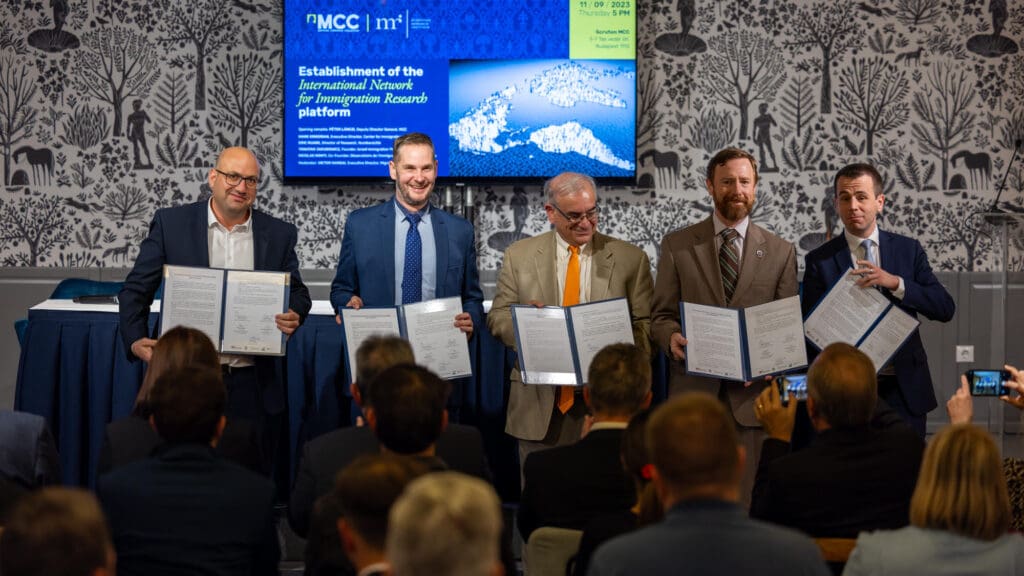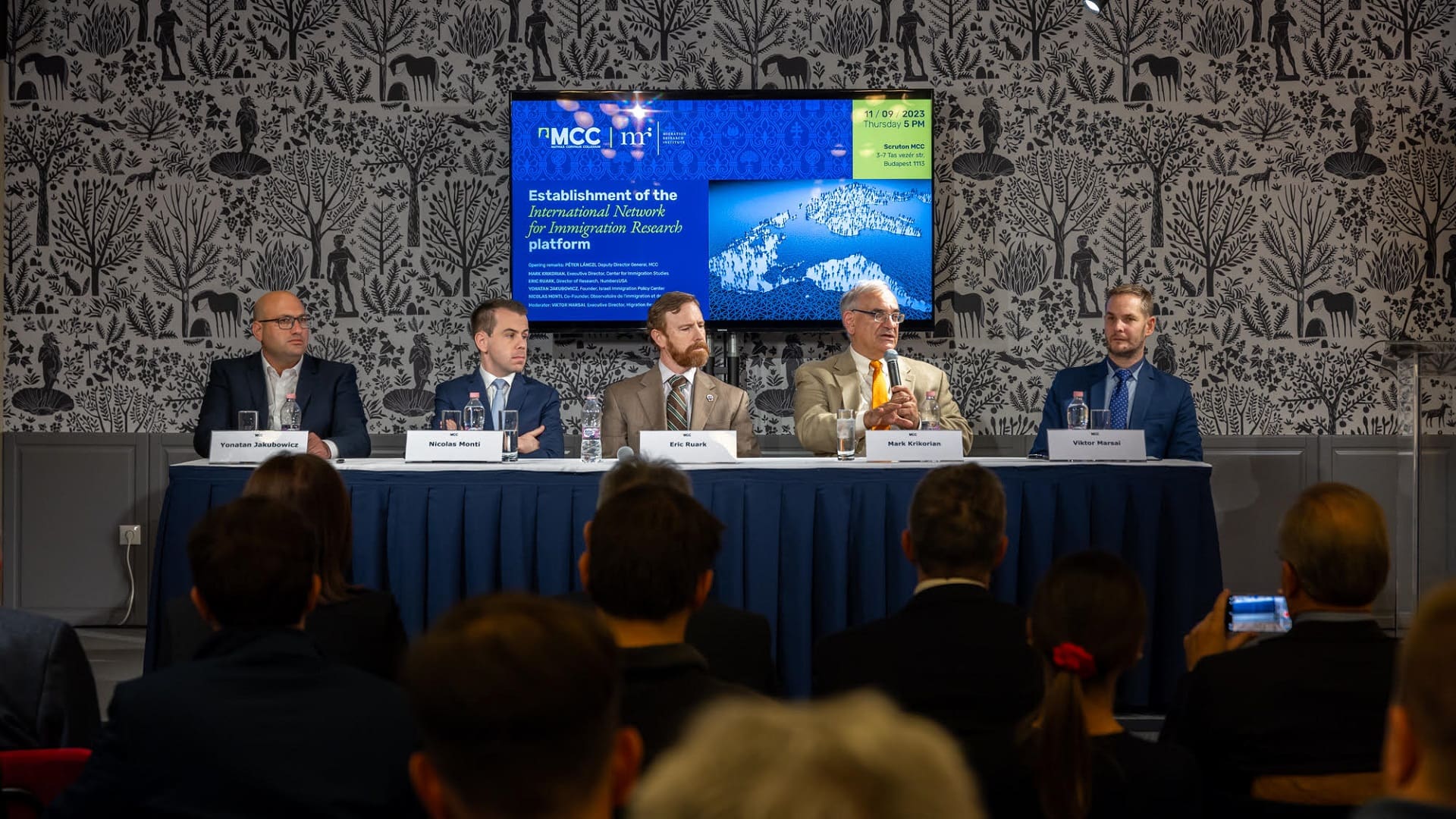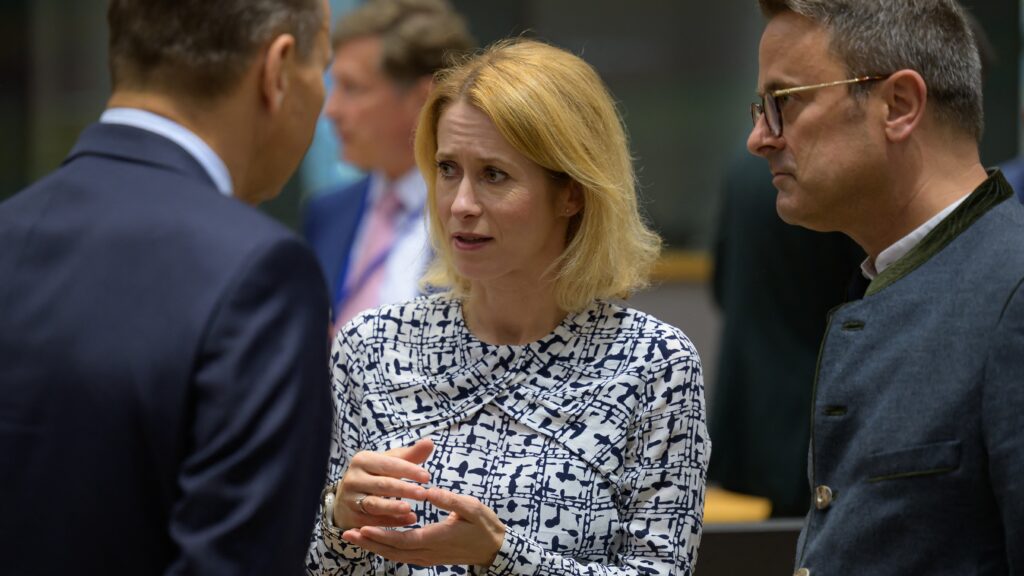Last month, the Mathias Corvinus Collegium (MCC) celebrated the establishment of their new research centre, the Hungarian Unity Institute, as well as their new campus in Dunaszerdahely (Dunajská Streda), Slovakia. And they have not run out of exciting new developments for this month either. At the MCC Campus in Budapest, Hungary, on Thursday, 9 November, a panel of immigration experts gathered to mark the foundation of the International Network for Immigration Research, and took part in the ceremonial signing of the establishment charter as well.
Before the panellists took the stage, Deputy Director General Péter Lánczi gave brief opening remarks. In it, he lauded the success story of MCC. In 1996, it started with just a handful of students, and by 2023, it grew to an institution of 7,000 students, with six research centres and a university in Vienna, Austria. Its Migration Research Institute was established in 2015, in the midst of the European migration crisis. Its goal was to counter the humanitarian-centred public dialogue about immigration at the time, and provide well-researched, fact-based counterpoints about the economic, social, and security implications of mass migration as well.
Now,
MCC’s Migration Research Institute has become part of a larger, international network of research centres, all studying the effects, aspects, and possible solutions of immigration.
Mark Krikorian, Executive Director for the Center for Immigration Studies from the United States, Eric Ruark, Director of Research for NumbersUSA, also from the US, Yonatan Jakubowicz, Founder of the Israeli Immigration Policy Center from Israel, and Nicolas Monti, Co-Founder of the Observatoire de l’immigration et de la démographie from France made up the panel for the inaugural roundtable talk of the Network. It was moderated by Viktor Marsai, Executive Director for MCC’s Migration Research Institute.
Mr Krikorian took the mic first, and he delivered the bad news that while most people think that the situation is bad at the US-Mexican border, it is actually much worse than that. He claims that the Biden administration let about 3 million illegal immigrants into the country since they took office. In his estimation, if President Biden is re-elected next year, the number of illegal immigrants in the country will double by the end of his second term.
What’s even worse, illegal immigrants coming from Mexico into the US no longer need to fear border patrol,
as they are usually released into the country on the pretence of their seeking asylum. Whether they actually apply for legal refugee status or not, let alone if their application is accepted, is hard to ascertain after that… In fact, Mr Krikorian recalled that when he recently visited the US’s southern border in Arizona, he actually saw migrants sitting patiently, waiting for border patrol to pick them up, knowing that they would most likely be let go soon after.
Mr Ruark gave a little bit of a historical overview of immigration into the United States. As he pointed out, the first significant wave of foreign nationals coming to the US to settle was in the 1840s, as a result of the Irish Potato Famine, when about 1.5 million Irish people fled to the US from the famine. The second wave, he continued, was after the American Civil War in the 1860s. As a result, newly freed African slaves built up a resentment towards immigrants at the time, claiming that they were taking jobs away from them. Even famed abolitionist orator Frederick Douglas became an anti-immigrant advocate. Mr Ruark believes that illegal immigrants are taking away employment opportunities from African-Americans in the US today as well.
It was Mr Monti’s turn to share his views on France’s immigration policy. Evidently, he did not have a very positive outlook on the issue, saying that the riots taking place in his country during the summer were ‘a sign of the failure of integration’. He also pointed out that ‘order was reinstated by drug traffickers, not by the government’ after the riots, and went on to criticize his country’s lax rules when it comes to obtaining citizenship.
On the contrary, Mr Jakubowicz reported he was very pleased with his country, Israel’s immigration policies. As he pointed out, the Jewish state used to be the #1 destination for illegal immigrants from Africa in the world. However, by cutting off the incentives, such as social security, migrants ceased to come, and about 10,000 of them even returned home on their own, without the need for deportation. He then referenced the proposed agreement with the African nation of Rwanda, which would have had it house African migrants instead of Israel, but that ended up falling through due to international pressure. However, with the United Kingdom now trying to make a similar set-up happen, Mr Jakubowicz hopes Israel could negotiate a new deal with Rwanda too.

About more positive developments on immigration legislation, Mr Ruark told the audience about House Resolution 2 (HR2) introduced by the new Republican majority in the US House of Representatives, according to which self-proclaimed asylum seekers could only enter the US if they can prove ‘credible fear of persecution’ in their home country. While the speaker is aware that it is unlikely to pass in the Democrat-controlled Senate, he hopes that Republicans can attach its demands as requirements for their passing the next federal budget, and thus get the Biden administration to act on it that way.
Mr Jakubowicz also spoke about the recent horrific attack on his country of Israel by the Palestinian terror group Hamas. He said that
every person in Israel has relatives or acquaintances who were killed in the Hamas attacks.
He went on to state that Israel’s counterattacks on Palestine are likely to trigger another wave of migrants towards Europe. The expert believes that the best solution would be if Egypt were to open its borders to the incoming civilian refugees. However, despite nominally supporting Palestine in the conflict, Egypt is not willing to do that.
Mr Krikorian said that the newly established research network is a great vehicle to share experiences and new ideas with people who are like-minded on immigration, which is exactly what this panel did too. With that, the five gentlemen got to the ceremonial signing of the establishing charter of the International Network for Immigration Research, which was followed by the handing out of glasses of wine, and a toast both the speakers and the audience took part in.
Related articles:








